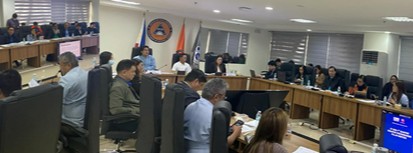
On February 4, 2025, the UP Resilience Institute (UPRI) participated in the first-quarter meeting of the Disaster Preparedness Pillar (DPP), hosted by the Office of Civil Defense (OCD) at Camp General Emilio Aguinaldo in Quezon City. Representing UPRI were Asst. Prof. Carlos Primero D. Gundran, MD, MScDM, FPCEM, Director for Institution Building, and Ms. Hazel Victoriano, Administrative Officer IV. The meeting gathered representatives from various agencies to discuss key developments in disaster preparedness and resilience efforts nationwide.
A major part of the meeting focused on the accomplishments of the Disaster Preparedness Pillar’s Technical Working Group (TWG). Member agencies presented reports detailing progress in capacity-building programs, improvements in early warning systems, and inter-agency collaboration. Challenges in implementation were also highlighted, with agencies identifying gaps and proposing strategies to enhance disaster preparedness moving forward.
One of the key discussions centered on the establishment of a Camp Safety Audit Technical Working Group. Led by the Department of Social Welfare and Development (DSWD), the initiative aims to create a standardized framework for assessing the safety, accessibility, and functionality of evacuation centers across the country. The group will be responsible for conducting audits and recommending improvements to ensure safer and more effective temporary shelters for displaced populations.
The meeting also reviewed the results of the third-quarter Nationwide Simultaneous Earthquake Drill (NSED) conducted on September 26, 2024. The exercise tested government readiness for a potential magnitude 7.2 earthquake originating from the West Valley Fault. Findings revealed critical gaps in response coordination, communication channels, and resource mobilization. As a result, agencies agreed on the need for enhanced inter-agency cooperation and scenario-based training exercises to refine the Harmonized National Contingency Plan.
Another significant update was on the operationalization of the National Service Reserve Corps (NSRC), a program under the Office of Civil Defense (OCD) and the Department of National Defense. Updates included the ongoing development of a Manual and Operating Procedures for the NSRC, alongside efforts to update graduate data and issue serial numbers through the NSRC Information Management System. Partner agencies such as the Commission on Higher Education (CHED), the Technical Education and Skills Development Authority (TESDA), and the Department of the Interior and Local Government (DILG) were urged to accelerate their contributions to ensure smooth implementation.
The discussion on the Public Service Continuity Plan (PSCP) emphasized the need for national government agencies to secure the continuous delivery of essential services during emergencies. The Secretariat introduced an updated PSCP Guidebook to provide a standardized framework for developing continuity plans. A review of agency compliance with submission requirements was conducted, with officials urging non-compliant agencies to fulfill their obligations in alignment with national directives and disaster preparedness policies.
Lastly, the Department of the Interior and Local Government (DILG) and the DRREALL PMO presented updates on the implementation of the Ligtas Pinoy Centers Act (RA 12076), which mandates the construction of purpose-built evacuation centers in every city and municipality. Current assessments indicate that only 12.2% of evacuation centers meet the required standards, with many relying on makeshift facilities such as schools and barangay halls. To address this, the DILG is conducting consultations and site visits to develop a comprehensive set of minimum standards for evacuation centers.
The meeting also outlined key activities for 2025, including the calendar of events for the Nationwide Simultaneous Earthquake Drill and National Disaster Resilience Month. UPRI reaffirmed its commitment to supporting these initiatives, ensuring that disaster preparedness efforts continue to evolve in response to emerging challenges.
